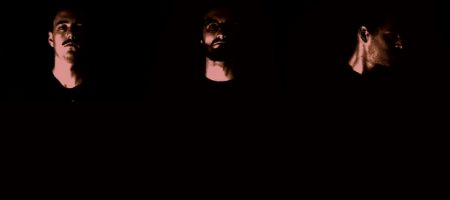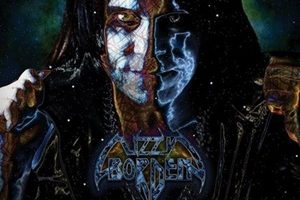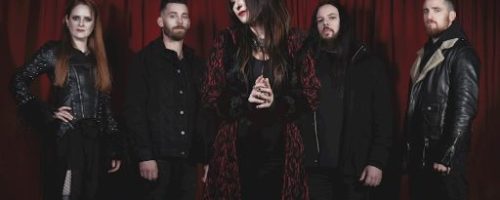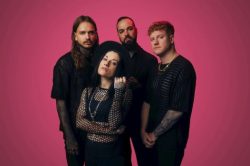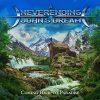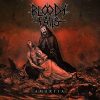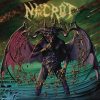Lizzy Borden – Abstract Commercial
Sunday, 3rd June 2018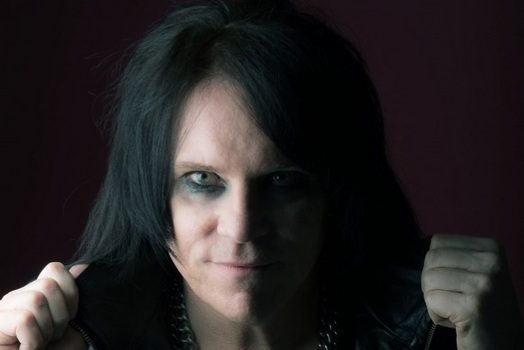
Bringing the best of his 70’s hard rock influences into a metal landscape of the 1980’s, Lizzy Borden was one of the important bands on Metal Blade to get the label off the ground and running. Their catchy, traditional songs in addition to putting on a killer, theatrical stage show made them favorites all around the world – albums like Menace to Society and Visual Lies favorites even to this day for this scribe. It has been 11 years since his last album Appointment with Death, but the man hasn’t remained idle – circling the globe and finding new countries to play for the first time, beyond his normal North America and European audiences.
Which brings us to My Midnight Things – an album that features Lizzy incorporating many of his older influences and accentuating hooks and vocal harmonies to the max. You can’t help but be swept away by the infectious melodies and haunting themes – delivered in a way that is quintessential Lizzy Borden. It’s hard not to get the choruses of “Obsessed with You” and “Run Away With Me” out of your head on the first listen, beyond the killer music that accompanies the lyrical content and themes. Reaching out to the man himself recently we caught up on why it took so long for a new Lizzy Borden to hit the streets, his relationship with long-time drummer Joey Scott, thoughts on the changing music industry landscape, and also how the internet has opened up new touring markets to younger generations for the band.
Dead Rhetoric: My Midnight Things is the first Lizzy Borden studio album in a little over a decade. Do you believe this is indicative of the changing music business model, where quality overrides consistently churning out albums year in and year out?
Lizzy Borden: For me, it was the collapse of the music industry. When it collapsed, there was no structure and I had put out two albums with no structure, just thrown out there and the labels didn’t understand how to use the internet well. It made no sense to make records- we just stayed on tour and found a new audience all around the world. They were a younger audience and we were having fun out there. At the same time, I did miss being a recording artist. Brian Slagel from Metal Blade Records came to me and said, ‘look- the industry is righting itself a little bit now, they are all working together and it’s a little bit of a different world out there.’ He convinced me to get back to making records and it would be a different story- and so far, that is so. I didn’t want to work in the environment that it was – it just didn’t make any sense to me. But now so far, everything seems to be going in a structured, professional way- which wasn’t the case when I put out my last album.
Dead Rhetoric: Where do you see this album sitting in terms of your discography? Do you set out with a framework and build from there when it comes to the songwriting and performances, or do you work off of face to face, hammering material out in rehearsal spaces spontaneously to get the best tracks?
Lizzy Borden: The way I write is so crazy (laughs). I call it abstract commercial. I write the vocals and the melody lines and the lyrics first. And then I find the right music and the right instruments that will work with it. I don’t wait for inspiration, I just work- and that’s the way that it works for me. The lyrics prompt everything- it prompts what kind of song this is going to be. Whether it will be a mid-tempo song or whatever, it tells you what it’s going to be based on the lyrics and the melody lines. That’s kind of the way I do it.
Dead Rhetoric: The feeling that I got after listening to the new record a few times is definitely that you felt more inspiration to go back to many of your early influences…
Lizzy Borden: Yes, my whole thing was going back to 100% of all my influences. Maybe 98% of my influences come from the 1970’s- I knew that this was going to be a record that I was going to draw on my influences and I wasn’t going to be watering it down with anybody else’s (influences) – which is usually the case. I’ve always written that way – but when I work with other musicians they’ll kind of bring in their influences and that alters the direction of the album. Sometimes that’s a good thing, and sometimes that’s awesome – but with this album I didn’t want that. I wanted it to be in one direction that I picked, and I think I achieved that.
As far as putting it on whatever, already this has been the most well-received album from the press I’ve ever had. Even my most successful albums have had mixed reviews. So far, I’ve been doing press for two and a half weeks and I’ve never seen the press that I am getting. I’m not saying that this is the best Lizzy Borden album, but this is getting the best reactions from the press so far.
Dead Rhetoric: How did the decision come about regarding the bonus tracks – is it always a difficult process to whittle down material to the core, and see what goes where?
Lizzy Borden: Well, bonus tracks in Europe, they’ve always wanted that extra push because it’s harder to sell albums over there. We did “Silent Night”, which I was really excited about and it turned out exactly the way I wrote it. I wanted to take that old song and make it really dark and interesting, and I achieved that. But it never got released, so I wanted to find a home for it. And the first version of “Long May They Haunt Us”, which is also on the record, I did a dark version of that and I wanted to find a home for that too – but I already did a reprise of the first track “Midnight Things”. Those two songs naturally fell into the bonus tracks slot. And then I did Eddie Bravo, he’s a jiu jitsu artist and if you Google him, you’ll know who he is- he’s a big Lizzy Borden fan and he recorded a song called “Waiting in the Wings” – and I came in and sang on it. That was sitting there too and never got released, so that’s the reason why those three songs ended up as bonus tracks.
Dead Rhetoric: Considering your strong emphasis on putting on a very entertaining, visually enticing stage show – do you believe that this has always been an important factor to retain fans and gain new ones consistently generation to generation?
Lizzy Borden: I don’t look at it that way. I don’t say I’ll put on a show and people will come. Even forming this band, the first ad I put out was looking for a bass player and a guitar player to form a theatrical rock band. It had nothing to do with ‘I think if I do a theatrical live show, people will like it’. I didn’t want to be in a band though that just stood there and sang. It held no interest for me at all. The show is because I want to do it and I’m excited by it. That’s really the only reason- and if people come because they want to see the show, that’s almost tragic because the songs aren’t getting listened to. I want people to hear the songs, and see the show, as all in one- and you can grasp what these songs are about in a visual way.
Dead Rhetoric: What are some of the greatest memories you have from Lizzy Borden in the 1980’s – specific albums, tours, or festival appearances that you made that will stay with you forever?
Lizzy Borden: Probably the first couple of festivals we played. We did a couple of festivals here in North America, but nothing prepares for you playing in a different country if you are from here. The first time we played the Reading Festival in the UK, in 1987, that was just a mindblower. You couldn’t even see the end of the people. You are playing to such a massive crowd. And then we move on to Germany and you are playing the Wacken Festival. And some of the other big festivals- we’ve done a lot since then. I think the festivals are the most interesting thing because you are playing to so many people, and a lot of them have never heard of you. That’s just the way that it is- they may be there to just to see the headliner, so you are playing in front of people who have never heard of you and win them over. You have to make sure you don’t leave that stage until you do, those are my biggest memories from that.
Dead Rhetoric: Do you feel like veteran bands like yourselves are at a bit of an advantage when it comes to sustaining interest for the fans because of the way the industry used to develop through major media outlets in heavy metal (in print publications, MTV, commercial radio) versus newer bands who while having the internet at their disposal, also have to compete against a larger number of bands and interests?
Lizzy Borden: Yeah. I don’t know if I have an advantage because with every seemingly advantage, there’s a disadvantage. You can get booked one time for a show, but then we don’t want to book them again next time because we already booked them. At the same time, the newer bands – they are throwing their little song out into a sea, and hopefully it gets picked up by certain people – and it doesn’t matter how good or bad the song is. Somebody could write “Dream On” right now, and no one would ever know. That structure is gone. To become a social media darling would become almost impossible for any band right now. Even older bands- but I don’t know what the answer is.
Social media is a two-edged sword. It’s great for some things, and it’s really so watered down that some people have had enough about your band. Eventually somebody will come up with something that’s like a big hub, and then you can go in and find new bands or find the older bands. That hub is not out there, that I can see, but it will be like the biggest record company in the world on social media. When that thing happens, I think it will be a lot easier to find the new bands and find the older bands.
Dead Rhetoric: The way younger generations consume content that flies at them instantaneously obviously differs from the older generation. How have you adapted to the changing tides with instant communication, social media, people buried into their phones – do you think there needs to be a balance between the technology world and dealing with life in real time?
Lizzy Borden: (laughs). I think everything weeds itself out. Everyone is addicted to this social media phenomenon because it’s come to their phones, they know where to search to find what they like. Eventually, it does get to the point where it will burn itself out. I don’t think we are going to have to try to alter that direction- I think it’s going to take its own course. People will say they are sick of this damn phone- but obviously there are things that you need to do. Because of vinyl coming back into play, kids are buying turntables and buying vinyl and listening. It changes the dynamic of how you listen to music- as opposed to putting headphones in your ears. I think that is helping a little bit in changing directions.
Dead Rhetoric: When you listen to music on vinyl, you have to become more mindful of what you are consuming versus listening to digital files that can fly through the ether…
Lizzy Borden: Exactly. It means more. Looking at the album cover. It’s not just listen to this and toss it away. Sometimes when I used to buy vinyl, it would take me two or three passes and on the first pass I would say, ‘oh- why did I buy this record?’, third pass I’m like, ‘wow- I love this record!’. That doesn’t necessarily get as much of a chance in the digital world. They listen to it once, they don’t like it, they never listen to it again.
Dead Rhetoric: Even in a headlining situation, I would imagine designing a set list that can satisfy the audience and yourselves can be a daunting task. How does the process evolve from tour to tour?
Lizzy Borden: For me, I am old school about that. The reason to tour is not for nostalgia reasons- it should be to promote the album. Our last tour was a best of because we were doing an anniversary tour. But for this tour, we have an album, so I’ll be playing songs off the album. That’s my main thing- I say to myself which songs I want to play off this album, and then whatever time is left I go through the back catalog and try to spread it out evenly over the back catalog. You promote the album that you are touring on- it’s not just a nostalgia tour where you play your best songs from your back catalog, and only one song off the new album.
Dead Rhetoric: How does it feel to be in this journey with a musician like Joey Scott, who has been there from the beginning of the band?
Lizzy Borden: It’s amazing. Even when I started this record, he hadn’t heard any songs and I was just recording and writing. Finally he came to the studio to listen, and I played him the first couple of songs and he was just doing backflips. He jumped on board and put down some amazing drums. He’s an old school drummer, and that’s the thing I am looking for. I don’t want a drum machine, I want that flowing thing that happens with the old school drummers. They are not machines or a Terminator. The explanations of what I wanted were very simplistic, he knew what the songs needed.
Dead Rhetoric: What did you think about being a part of Brian Slagel’s recent book?
Lizzy Borden: I figured we would be, as we were a huge part of his label. In 1987 we were the biggest band on Metal Blade. It was great to be a part of that history, we’ve been a part of it since the very beginning. We’ve been in so many different books, to see this one first hand- to see him going from his mom’s garage to where he is now, you don’t see many people do that in your own lives. To see that was great, and to have him write a book about it was even better.
Dead Rhetoric: Would there be a possibility down the line of a Lizzy Borden book?
Lizzy Borden: Yes, I hope so. There have been so many things that we’ve done that are just mind-blowing. Stuff that I don’t even tell anybody- the adventures on tour. I’d love to write a book. Unless it’s going to be done the right way, I’m not going to do it- so I’m waiting for the right offer to come along.
Dead Rhetoric: What concerns you most about the world that we live in today?
Lizzy Borden: There’s a lot of that. An artist developing and moving on, sometimes you go forward, sometimes you go backwards, sometimes you make mistakes. Trying to figure out our way with technology and all these things interfering with the normal trajectory of the human race. I think it will right itself, it’s just like anything else. It’s because everything is just new now. When we started, touring in South Korea was impossible. On our last tour, we played South Korea- it was an amazing tour, and the crowd went crazy for us. Just to see that happen can change your mind about anything. We played Russia- that was the last show we’ve played together. To think about that happening would be impossible for us in the 1980’s. It’s not as dire as the news makes things out to be. We are going through some growing pains because of technology.
Dead Rhetoric: You said that you are appealing to a new generation of Lizzy Borden fans. What surprises you most about getting into this second and third generation of fans?
Lizzy Borden: Because I never thought it would happen! When you are a band from the 80’s, your fanbase stays with you and you see the same faces out there. But on our last tour, we played to early 20- year-olds throughout every country around the world. It was something that blew my mind- they discovered through the internet the back catalog, came to see us play, and that enthusiasm is the same enthusiasm in the 1980’s really. I love them, they have the same response to us that the fans in the 80’s had. That kind of fanatical energy and excitement for every song- it’s such a great time to be able to perform with that excitement, that renewed excitement. I’m so thankful and excited that it has (happened).
Dead Rhetoric: What’s on the horizon for the rest of 2018 into 2019 to support the new record?
Lizzy Borden: The first thing will be videos. We just finished the first video that will be coming out soon for “Long May They Haunt Us”. We are going right into writing the script for the second video, and we will film that in a couple of weeks. Video and press are the two things that are dominating life right now. And then, I’m also working on the “My Midnight Things” show- get that up and running, and I will find a great lineup to come out on the road with me. Then we will start booking shows and get this on a world tour.
We want to get to Brazil, we have a lot of cool bucket list countries to play. I love touring, and I love new countries. You are always uncovering things that you didn’t know.











